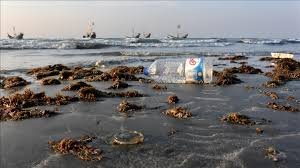A clean-up initiative will begin on St Martin’s Island, located in the Teknaf upazila of Cox’s Bazar, starting in mid-February. The move comes after tourism activities were suspended for the next nine months in a bid to restore the island’s environment, which has been adversely affected by tourism.
Mohammad Salauddin, the Deputy Commissioner of Cox’s Bazar, confirmed that the clean-up operation would be coordinated by the district administration, in line with directives from the Ministry of Environment, Forest and Climate Change. “With the end of the tourism season, our focus is now on revitalizing the island’s natural environment, which has suffered from the impact of tourism. Local residents will be engaged in the clean-up to help boost their livelihoods,” he stated.
In December and January, 14 tonnes of plastic and polythene waste were collected from the island as part of a program where waste was exchanged for essential food items, including rice, oil, lentils, and biscuits.
In a bid to protect the island’s fragile ecosystem, the Ministry of Environment, Forest, and Climate Change restricted tourism to only three months of the year—November, December, and January—and limited daily visitors to 2,000. These measures were implemented to curb pollution and safeguard the island’s biodiversity.
St Martin’s Island was designated as an Ecologically Critical Area by the Department of Environment in 1999. Furthermore, in 2023, the government declared a 1,743-square-kilometre stretch of the Bay of Bengal near the island a protected area under the Wildlife Act.
The effort to regulate tourism began in August 2020, when the government tasked the Center for Geographical Information Services (CEGIS) with conducting a study. The research revealed that the primary cause of environmental degradation was uncontrolled tourism. It also recommended that tourists be prohibited from staying overnight on the island.
Despite the island’s capacity to handle 2,000 tourists daily, last year saw daily numbers reaching 10,000 to 12,000. The rapid growth of tourism led to the illegal construction of 230 hotels and motels, many of which lack proper waste management systems, resulting in significant pollution.
Studies also show alarming environmental concerns, including high levels of bacteria in the island’s water and the overexploitation of marine life, such as crabs being caught for tourists. Additionally, boat traffic and campfires have put three species of sea turtles at risk, while excessive tourism has contributed to a sharp decline in groundwater levels.



